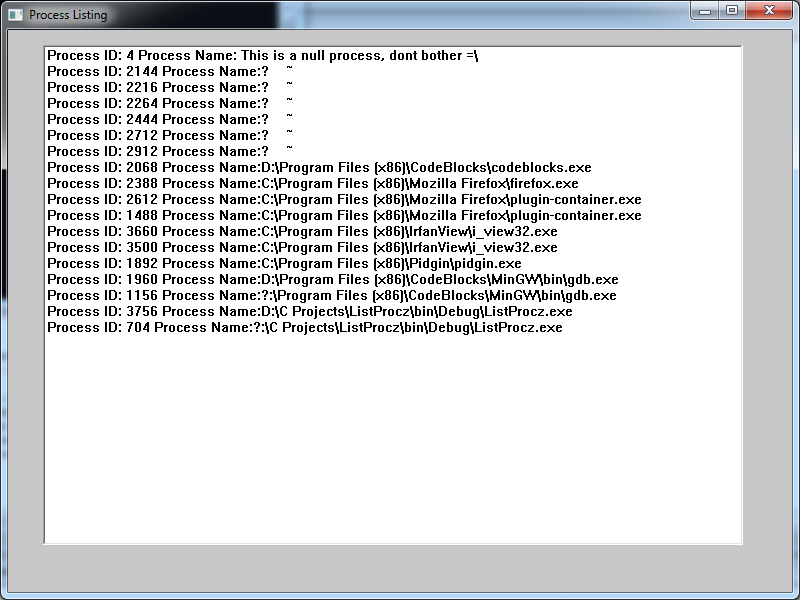Have you ever wondered how to make your own task manager? That thing that pops up when you press control+shift+escape and shows all the process names, ids and files associated with them? Well now you can!
What you need is a C compiler, the dll, and the library. You can download them here: PROCS
The code below creates a window, and a listbox control then proceeds to populate the contents of said listbox with a for loop going through each process.
The meat and potatoes are in the ‘procs’ library which make the calls easy as pie. The definitions in procs.h are as such:
DWORD __stdcall GetNumberOfProcesses();
BOOL __stdcall GetProcessIDList(DWORD dwIDArray, DWORD dwArraySize);
BOOL __stdcall GetProcessPath(DWORD dwPID, char *szBuff, DWORD dwBuffSize);
BOOL __stdcall GetProcessBaseSize(DWORD dwPID, DWORD *dwImageBase, DWORD *dwImageSize);
DWORD __stdcall GetNumberOfModules(DWORD dwPID);
BOOL __stdcall GetModuleHandleList(DWORD dwPID,DWORD *dwHandleArray, DWORD dwArraySize);
BOOL __stdcall GetModulePath(DWORD dwPID, DWORD dwModh, char *szBuff, DWORD dwBuffSize);
BOOL __stdcall GetModuleSize(DWORD dwPID, DWORD dwModh, DWORD *dwImageSize);
DWORD __stdcall GetProcessPathID(char szPath);
HANDLE __stdcall GetModuleHandleEx(DWORD dwPID, char szModule);
Internally the library makes use of the PSAPI functions supported from the win32 lib for creating a working set from the process list. This library saves me a ton of time and was written by a rockstar of the reverse engineering community – Yoda. I found the library within his tool LordPE available here:
http://www.woodmann.com/collaborative/tools/index.php/LordPE
Here’s what it looks like compiled:
Here’s the code:
#include
#include #include “procs.h” #include DWORD ProcList(void); LRESULT CALLBACK WindowProcedure (HWND, UINT, WPARAM, LPARAM); char szClassName[ ] = “Oh god not the bees!”; int WINAPI WinMain (HINSTANCE hThisInstance, HINSTANCE hPrevInstance, LPSTR lpszArgument, int nCmdShow) { HWND hwnd; MSG messages; WNDCLASSEX wincl; wincl.hInstance = hThisInstance; wincl.lpszClassName = szClassName; wincl.lpfnWndProc = WindowProcedure; wincl.style = CS_DBLCLKS; wincl.cbSize = sizeof (WNDCLASSEX); wincl.hIcon = LoadIcon (NULL, IDI_APPLICATION); wincl.hIconSm = LoadIcon (NULL, IDI_APPLICATION); wincl.hCursor = LoadCursor (NULL, IDC_ARROW); wincl.lpszMenuName = NULL; wincl.cbClsExtra = 0; wincl.cbWndExtra = 0; wincl.hbrBackground = (HBRUSH) COLOR_BACKGROUND; if (!RegisterClassEx (&wincl)) return 0; hwnd = CreateWindowEx ( 0, szClassName, “Process Listing”, WS_OVERLAPPEDWINDOW, CW_USEDEFAULT, CW_USEDEFAULT, 800, 600, HWND_DESKTOP, NULL, hThisInstance, NULL ); HWND hListBox = CreateWindowEx(WS_EX_CLIENTEDGE, “LISTBOX”, NULL, WS_CHILD | WS_VISIBLE | WS_VSCROLL | WS_HSCROLL, 35, 15, 700, 500, hwnd, 666, hThisInstance, NULL); DWORD psz,pid; HANDLE process; char process_name[1024]; char pidmsg1[512]; char pidmsg2[512]; DWORD list[1024]; DWORD numoprocs = GetNumberOfProcesses(); if(!GetProcessIDList(list,psz)) { MessageBox(NULL,”Damnit!”,”GetProcessIDList failed for some reason.”,MB_OK); ExitProcess(0); } int cnt; for(cnt = 0;cnt 

